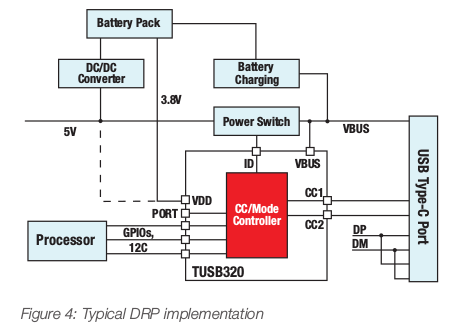Other Parts Discussed in Thread: BQ25606, TUSB320
We are trying to design a USB-C compliant system with USB2.0 OTG functionality. The requirements are as follows:
- Fits within USB-C native power profile (15W). USB-PD not needed.
- Device will be a DRP, with a Try.SNK preference when connected to another DRP.
- Battery must charge at 3A when connected to dedicated charger. Device can be powered on or off while charging.
- When connected to a DFP, must charge at the current capacity indicated on CC pins.
Based on the couple of USB2.0 -> USB-C transition whitepapers on the TI website, we picked the TUSB320LAI as the CC controller. We are considering the BQ25606 as the battery charger. However, there are some issues with this:
- In order to configure the TUSB320 as Try.SNK, it must be operated in I2C mode. And when in I2C mode, presumably the system processor needs to read TUSB current mode via I2C and then switch the Rlim current-limiting resistors on the battery charger IC. But what happens if the device is off while charging? Somehow the current mode still needs to be conveyed to the battery charger. I assume this could be done via levels on the GPIO OUT pins - which means that the TUSB must be in GPIO mode. However, when the device is on, the TUSB320 definitely needs to be in I2C mode. So - can the TUSB mode be switched dynamically, from GPIO (when device powered off) to I2C (when device powered on)?
- The BQ25606 appears not to be an appropriate charger anyway, since it sets input current limit per Dp/Dn levels, according to the BC1.2 spec. When a DCP is detected (with Dp/Dn shorted) it limits charging current to 2.4A. So we cannot avail of the full 3A native capability of USB-C. Is there a charging solution that will set up charging current based on current mode detected on the USB-C CC pins?



